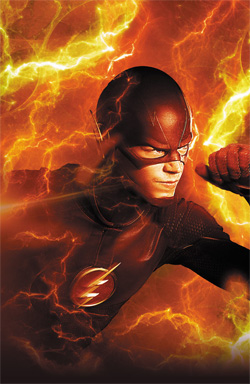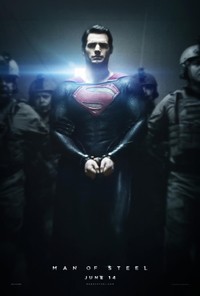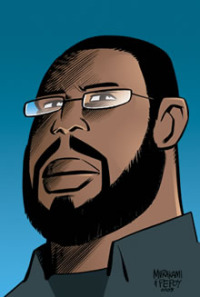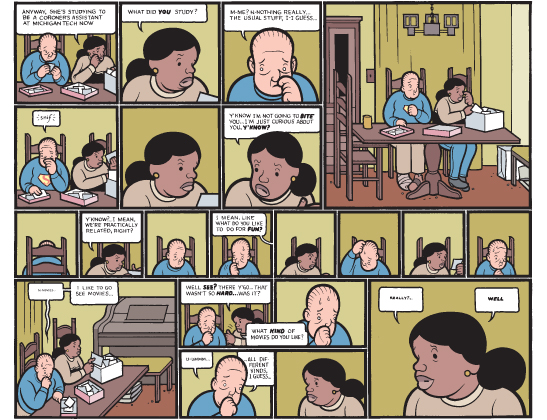 Normally what I watch on TV can be reduced to Stephen Colbert, the NBA and shows with Gordon Ramsay. This fall season, I've rededicated myself to following a select few new shows. They're all based on DC comics, yes, so maybe I'm not so much getting into TV as I am keeping up with comics. The reboot of all DC Comics continuity was designed to be a jumping-on point for new fans, but it also functioned as a jumping off point for readers like me. My hands washed free of continuity, I had no reason to care about these new characters that had replaced my old favorites.
Normally what I watch on TV can be reduced to Stephen Colbert, the NBA and shows with Gordon Ramsay. This fall season, I've rededicated myself to following a select few new shows. They're all based on DC comics, yes, so maybe I'm not so much getting into TV as I am keeping up with comics. The reboot of all DC Comics continuity was designed to be a jumping-on point for new fans, but it also functioned as a jumping off point for readers like me. My hands washed free of continuity, I had no reason to care about these new characters that had replaced my old favorites.
When I heard that DC was going full bore at a slate of TV shows based on their characters, I was interested. I especially enjoyed how different all the new properties were -- different networks, different genres, different audiences. They all debuted in October and I got my money's worth of Hulu Plus subscription.
The first show to debut was GOTHAM, a Detective Jim Gordon series that takes place before Batman, but post-Wayne murder. The idea is that it's an origin story for everyone except Batman. All of these villains, power structures, reputations and more are being formed in this deeply corrupted city, the lowest point of Gotham history before the realization of Batman.
Unfortunately, as Grantland said, this also means it's a story about people before they did anything interesting. The only interesting thing about these characters is that some day they will be a piece of fabric in the web of the Batman mythos. Right now it's just a little girl hugging a plant. When her mom calls her "Ivy" we're supposed to go "OH I GET IT" but in reality it just makes you cringe.
Yet, I wouldn't call it a bad show. What it is is an up & down show. There are completely joyless episodes where nothing makes me want to stay past a commercial break, and there are episodes where I feel like they're on to something. The most consistent joy you can get from this series is just by looking at it. The series is full of vibrant but saturated sets, luxurious art-deco sets, and character actors hamming it up on a variety of seedy archetypes. Technology is roaring 20's based, except when it needs to stray from it, and the diverse populace of Gotham are doing outrageous theater. It creates an interesting atmosphere, almost a weird crime-fantasy show, as opposed to a DARK KNIGHT also-ran.
The tone occupies this weird space between BATMAN FOREVER and THE DARK KNIGHT -- sometimes it's coldly realistic and subdued, other times a colorful villain murders people by tying them to a weather balloon. Without any caped characters, it's really more of a Dick Tracy show, and that's not a bad thing. I certainly wouldn't want the show to devolve into a realism-based police procedural when it, sometimes, does things that you can't find on TV right now.
The prequel pretense is troubling though and robs it of the drama. We know Gordon will never catch the Wayne murderers, we know Penguin won't ever be killed, we know Carmine Falcone will eventually end up on top of the gang war. These characters are robbed of any suspense. Meanwhile, any originals -- like Fish Mooney -- are almost assuredly going to be killed or written out before the dust in Gotham settles. It's a tough spot to write and I frequently wonder what they can do to make the show vital and unpredictable. That curiosity is what keeps me watching it more than anything.
The 2nd show to debut, and DC's best, is THE FLASH. I'm not normally a CW television show watcher, where everything is just a little bit above low-budget cable and all the principle roles are played by young models. But The Flash works as an optimistic, thrilling, and easy-to-like superhero show. Not a gritty crime show, not dark and foreboding. There's enough wonder and heroism here that it's a genuine joy to watch. It's not heady television with big themes, sure, but neither are a lot of comics. You get joy just seeing characters interact, seeing The Flash pull off some well-scripted stunts, and the occasional one liners from a cast that is entirely likeable. The CW's other superhero show, ARROW, is an unabashed low rent Batman show. A wealthy urban vigilante saving his city because for whatever reason they couldn't/wouldn't use Batman. THE FLASH, then, is CW's Superman -- science fiction powers, high on spectacle, and based on inspiring good over justice & vengeance. I am shocked at how much I've been enjoying the show, the stories, and the performances. It even made me check out ARROW, which I hear starts out okay, gets bad, but then gets really good. I'm currently waiting for it to get good.
In last place is the paranormal themed CONSTANTINE on NBC, based on one of Alan Moore's premiere contributions to DC Comics. What I was hoping this would be was a grimy, character-driven, paranormal procedural. Take the bastardness of House, apply it to X-Files mystique and give him a world and lore built on mythology and magic. All we really get is the aesthetic of John Constantine: the accent, the look, the spells, but there's no charm or soul to any of it. NBC's John Constantine dresses up in his trademark brown trenchcoat and red tie, but it feels like he's playing dress up. The fact that his tie is always slightly undone no matter what makes it feel like a Constantine that is constantly concerned with looking cool. I know that's what it's like when they draw Constantine in the comics, but coolness isn't just a look, it's a demeanor. He should look that way because he just so happened to arrive at it without a care in the world.
There's also the problem of magic. Magic storytelling is always tough, even in the comics, because it gives the writers the ability to write forward motion in stories without any tension. If you need to move a story along or get someone out of a pickle, just throw in some magic spell that we didn't know about before. How do Constantine & friends find out who killed a dead DJ? There's a spell for that (it comes at a cost of a few days of Constantine's life, but I'll be surprised if that ever makes a difference in the show's run.) How do Constantine & friends find out what the villains are planning to do next? Their visionary pal just so happens to see a white tiger right at that moment, and, wouldn't you know it, there's a college radio station with a white tiger mascot.
It's not Deus Ex Machina, but it's close. Magic fight scenes are similarly devoid of any anchor that you can connect to. Participants just point at each other and things happen. A few latin words and the bad guys explode into a portal to hell, or something, because he can do that. He doesn't do it often because then that solves all problems, and magic is mysterious so they'll never explain it. I recognize that it's tough to work within those parameters, but it's hard to forgive when everything surrounding is devoid of life, charm and character.
More than anything, superhero television should have a ton of character to it. They've been refined for decades -- sometimes 70+ years. The work has been done for you, and it's disappointing when their small screen adaptations don't have any of the soul that has driven them on the page for so long.






